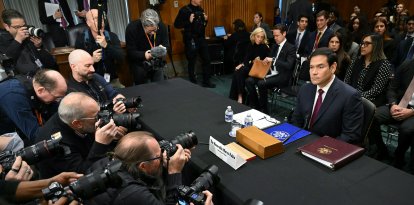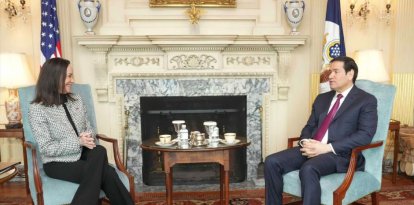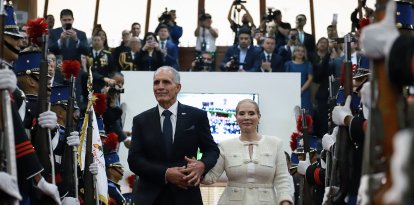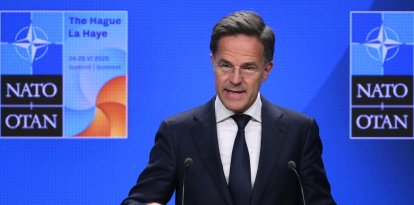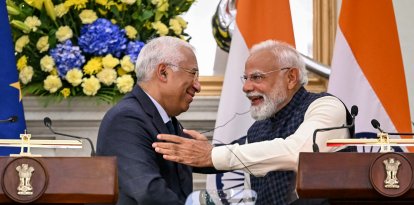Javier Milei's road to the Argentine presidency includes allying himself with a former rival and appealing to the undecided
The libertarian economist will compete for the presidency with Sergio Massa, the current economy minister who topped the first round of elections.

Edit a partir de captura de pantalla (TN)
Despite the fact that the polls projected Javier Milei as the favorite finish first in the Argentine elections and flirt with an outright victory, the 30% that he obtained was topped by 36% by the ruling party candidate, Sergio Massa. Now, the two will face off in a runoff election on Nov. 19 to determine the next president of the South American country.
According to local electoral laws, whoever obtains the majority of "validly cast affirmative votes" in the runoff will lead Argentina from Dec. 10 and until the same date in 2027.
Currently, Alberto Fernández and Cristina Kirchner govern in Argentina, but they decided that the ruling party's candidate would be Massa, the current economy minister who is sold as a more moderate option. Despite projections that it would be the the worst election in the history of the Peronism party, Massa surprised and gained 9 points since the primary elections, recovering seven provinces and gaining more momentum heading into the second round. Statistically, he is 14 points away from reaching the Casa Rosada.
On the other hand, Milei barely improved upon his performance in the primaries, and 21 points separate him from the presidency. While he's further away from a majority than his competitor, the libertarian economist has a clearer path toward that number.
The big question for Argentines is what percentage each candidate will get from the political parties that were left behind in the first round of elections.
Patricia Bullrich's votes
The candidate endorsed by former President Mauricio Macri took third place with 23% of the votes (6,267,152). Her party, Together for Change, is the union of three parties holding different ideologies: Republican Proposal (center-right), Radical Civic Union (center-left) and Civic Coalition (center-left). Bullrich was the candidate from the first of these parties, which also happens to have greater popular representation than the other two. However, in a second round scenario, Milei would also need the votes from the other two parties that are ideologically closer to Massa.
In this equation, there is another important political actor: Horacio Rodríguez Larreta. The mayor of Buenos Aires and fan of Racing Club de Avellaneda represented the left-most wing of the coalition in the August primaries and was defeated by Bullrich. The issue is that she lost more than half a million votes between the primaries and the general elections, a number that would be made up mostly of Larreta voters, who decided to support other more ideologically friendly options.
For example, Milei would be better off if all Larretista-leaning voters had already abandoned him in the first round, because he would have more potential voters within Bullrich's 23%. Now, because those who voted for the mayor of Buenos Aires were loyal to the party in October, the libertarian economist will have fewer supporters among that 23%, and, therefore, less chance of reaching 50% of the votes in the second round.
For now, Patricia Bullrich has already publicly endorsed the libertarian, and they even appeared together on Wednesday night on the program "A Dos Voces" (TN).
According to estimates, Milei will likely need 17-18% of of Bullirch's votes, allowing himself to lose 5% or 6% to Massa or non-voters. In addition, he would need to scrape off some of the vote of Juan Schiaretti, the governor of the province of Córdoba who came fourth in the general election.
Juan Schiaretti's votes
The votes for the governor of Córdoba could be the most coveted, since they are the ones that seem most unpredictable heading into November. The reason for this uncertainty is because Schiaretti is a Peronist by origin, so one could assume that given another Peronist (Massa) and a libertarian (Milei), these voters would not have many difficulties in choosing the former.
However, the key detail is that the majority of his 1,784,315 votes, 665,717, came from the province of Córdoba, which is deeply anti-Kirchnerist. For example, the people of Córdoba strongly supported Mauricio Macri in 2015 and 2019 over Cristina Kirchner's candidates. In this last election, 61% of their vote was divided among six other candidates.
In the event that Milei can equate Massa with Kirchnerism (the faction of Peronism led by Kirchner) in the eyes of these voters, there is a good chance that Schiaretti's vote will lean mostly towards the libertarian.
Going back to the initial calculation, with 17% or 18% of Bullrich's votes, Milei would need one third of Schiaretti's votes to be president.
Myriam Bregman's votes
The leftist candidate obtained 709,000 votes in the first round of elections, and her voters have been off-put by Milei throughout the campaign, since the libertarian candidate is openly critical of socialism. These voters are very likely to support Massa, who would need 20% of Bullrich's votes, 75% of Schiaretti's votes and 50% of the Left Front to become president and keep Peronism in power.

















